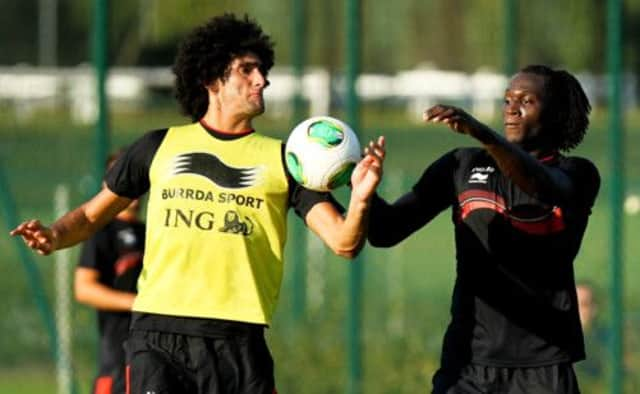Tom English: Belgium ultimate test for Scotland


In Spain, the spend was £335m, up 205 per cent year-on-year. In Serie A it was also £335m, in Ligue 1 in France it was £315m and in the Bundesliga it was £230m. The top five leagues plunged to the tune of £2.1bn.
No wonder Michel Platini sounded like a man who was hedging his bets when he was asked about the financial fair play rules that Uefa have introduced in an attempt to row back the vulgar spending and make clubs more fiscally sane. This is Platini’s baby and he has promised all sorts of penalties on those clubs who continue to lose eye-watering amounts of money in the seasons to come. In an effort to sound like he meant business he has spoken about points deductions and expulsions from tournaments being visited upon clubs who pay scant regard to book-balancing.
Advertisement
Hide AdAdvertisement
Hide AdThe other day, in an interview carried out in Monaco, a short distance from the ground of the club that has spent £200m this summer alone, Platini came across as an administrator who was beginning to weaken. “It is a work in progress,” said the Uefa president about his rules on finance. “Sanctions will be decided upon. Do not think we are going to take five to ten clubs out of the European competition. Definitely that would be the very, very last straw. If we have repeat offenders okay, yes, they will have to be punished severely – possibly.”
Possibly.
Maybe.
Perhaps.
The closest thing that Scotland is going to get to the vulgar excess that has gripped the transfer market in Europe is Friday night, when Belgium and their Harlem Globetrotters team of all the talents arrive for a World Cup qualifier. By our reckoning, the Belgium squad that’s coming to Glasgow has about £150m worth of talent in its midfield and attack. That’s not a speculative £150m. That’s, pretty much, what clubs have paid for these players, from the £32m that Chelsea paid Lille for Eden Hazard, to the £32.5m Zenit paid Benfica for Axel Witsel, to the £27.5m Manchester United just paid Everton for Marouane Fellaini.
In the last few weeks, members of this Belgian squad have been transferred to Atletico Madrid, Tottenham, Manchester United and Napoli for a total fee of over £50m. By comparison, the main piece of business involving a player in Scotland’s squad was Jamie Mackie, sold to Nottingham Forest for a million quid. You cannot look at the respective squads without wincing, particularly now that Scotland have suffered some grievous losses through injury.
Look at Belgium’s goal-scorers in their matches in the group so far. Kevin de Bruyne, a favourite of Jose Mourinho’s at Chelsea. Fellaini, one of the most expensive players Manchester United have ever bought. Hazard, Christian Benteke, Kevin Mirallas, Jan Vertonghen. Their leader, Vincent Kompany, will be missing on Friday, as will Arsenal’s Thomas Vermaelen, but the star count remains improbably high. There’s Nacir Chadli and Moussa Dembele of Spurs, Romelu Lukaku, on loan to Everton, Dries Mertens of Napoli and the 17-year-old striker, Zakaria Bakkali, who has started four games for PSV Eindhoven and has scored four goals, including a mesmeric hat-trick.
The bad news is writ large over the Belgian squad list. The slightly more encouraging news is that this team is still young and hasn’t yet – emphasis on the ‘yet’ – developed a true killer instinct or a habit of inflicting humiliation on inferior opposition. They look like a team – or a collection of individuals – that could utterly annihilate most sides, but that ruthlessness hasn’t been all that evident so far. They have played seven matches in the group and the most recent of them have brought a 2-1 win over Serbia and a 1-0 win over Macedonia. They have eased into the lead at the top of Group A, three points clear of Croatia, but with the exception of a 3-0 demolition job on Serbia they haven’t looked as imperious as their cast of characters suggests they ought to be.
We look at Belgium not so much in the context of whether they can make it to Brazil for the World Cup next summer – they surely will – but how good they are going to be when they get there. Friday night at Hampden should be a decent test of their mettle as well as their quality. For Scotland, it promises to be the ultimate test. The win over Croatia and much of the performance – if not the awful set-piece defending – at Wembley brought new confidence, but a competitive Belgium is a step up on Croatia and a couple of steps up on England. There is hope, but let’s wish that there is also fear.
Scotland are at their best when they are in fear of a drubbing – and that fear should be pretty acute on Friday. Fear, when channelled correctly, can be a powerful thing, just as it was in Zagreb. The powers of concentration that evening were immense and had a lot to do with the fear of what might have happened to them had they not been so focused. Fear can work wonders. It can inspire. And inspiration is what is required against Belgium. One of these nights they are going to click as an attacking force and more of the chances that they routinely create in matches are going to be converted. Much to be worried about, then. And that’s no bad thing for Scotland.